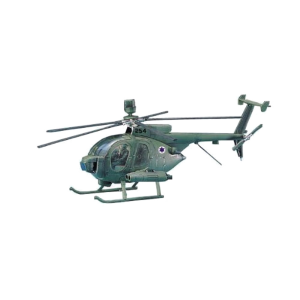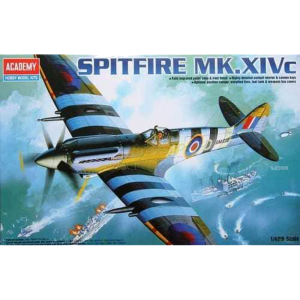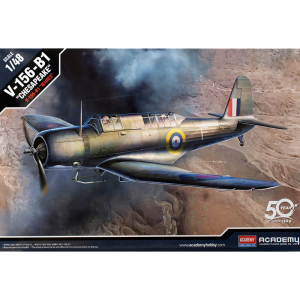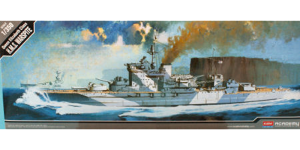Description
In 1934, a German pocket battleship was commissioned as Admiral Graf Spee who was a major figure in German naval history for his wide ranging combat operations at sea with a squadon of armored cruisers during World War I before being lost with most of his squadron at the Battle of the Falkland Islands in 1914. The pocket battleship bearing his name was laid down in 1932 as a Deutschland-class cruiser to remain within the bounds of the Treaty of Versailles, but through innovative German engineering, she was armed as a contemporary battleship and later dubbed as a ‘pocket battleship’.
The Admiral Graf Spee entered service in 1936 and served as the fleet flagship until assigned to maritime control duties off the coast of Spain during the Spanish Civil War. As World War II started to unfold, the Admiral Graf Spee was dispatched with a support tanker into the South Atlantic to interdict British supply shipping. The battleship’s captain conducted his interdiction mission quite effectively had the distinction of destroying his targets without loss of life among the affected crews.
While the Admiral Graf Spee kept the upper hand in the South Atlantic for about a year, the Royal Navy finally caught up to the vessel off the coast of Uruguay and the resulting battle seriously damaged HMS Exeter as well as inflicted hits upon HMS Achilles. Even so, the Exeter’s own fire caused extensive damage to the Graf Spee forcing the ship to enter the neutral port of Montevideo, Uruguay. To avoid internment, the ship had to leave before the damage could be adequately repaired, and with the British waiting offshore, the captain sailed out of the harbor and scuttled the damaged battleship offshore to save the lives of his crew.
Following their great kit of the USS Oliver Hazard Perry kit last year, Academy started working on this overlooked subject in 1/350 – the Admiral Graf Spee. According to MRC, Academy learned of Trumpeter’s intent to produce the Graf Spee as well, so the designers focused on keeping the model highly detailed, yet easy to build, and keep the retail price low. I think they did a nice job of it as they had a build-up of this kit on display at iHobbyExpo 2009.
The kit is molded in light gray styrene and presented on seven parts trees. The hull is molded in halves, with a molded-in cut line inside the hull to make it easy to turn this model into a waterline display, complete with a solid bottom provided in sections on the third tree. Should you opt for the full hull, the rudders and twin- shaft propulsion is provided along with a display base and name plate.
The main deck is comprised of two sections, plus a third section for the stern. The instructions have you pre-paint these deck sections prior to assembly. For the modeler’s convenience, colors references are provided using GSI colors (Gunze Sangyo), Life Color, Humbrol, and Testors Model Master paints.
One of the nice features of this kit are the styrene railings. Academy is using more advanced injection molding technology as they’ve been able to reproduce the two-bar railing in sections that will be easy for the average modeler to install. While more advanced modelers may want to use photo-etched railings for greater scale accuracy, this is one of the better renditions of railings in styrene seen and the average modeler will be happy with the final result. On the other hand, install the railings last rather than risk damaging them while handling the model during assembly.
Another nice feature of the kit are the slide-molded main guns – the barrel ends are hollow so there won’t be any need for drilling out the ends or replacing them with brass or aluminum barrels.
The kit has an Arado Ar 196 floatplane to mount atop the catapult. If you look at that catapult, that is a very short cat stroke to get the aircraft airborne. It must have been a powerful stroke!
Assembly of the ship is really straightforward and Academy has done a great job of not over-engineering the kit. Nevertheless, there are lots of small parts and a project like this will take a little skill and patience to get a nice result.
If you opt for a full-hull build, a stand and nameplate are provided. You’ll probably want to mount the two stand bases to a wood or other baseplate for a more rigid/sturdy display.
By the way, there are a number of parts on these trees that are not used for the Graf Spee, so I think it is safe to say that we’ll be seeing a Deutschland or an Admiral Scheer (or both) coming in our future.
Markings are only provided for the Admiral Graf Spee and its aircraft. My only complaint is that they’ve made the swastikas nearly impossible to use with the way these decals are laid out. We’ll have to await aftermarket options to properly mark this kit.
Academy not only beat the Trumpeter kit to market, they did so with a kit that is half the price. This kit should appeal to the average modeler and make for a pleasant build.





